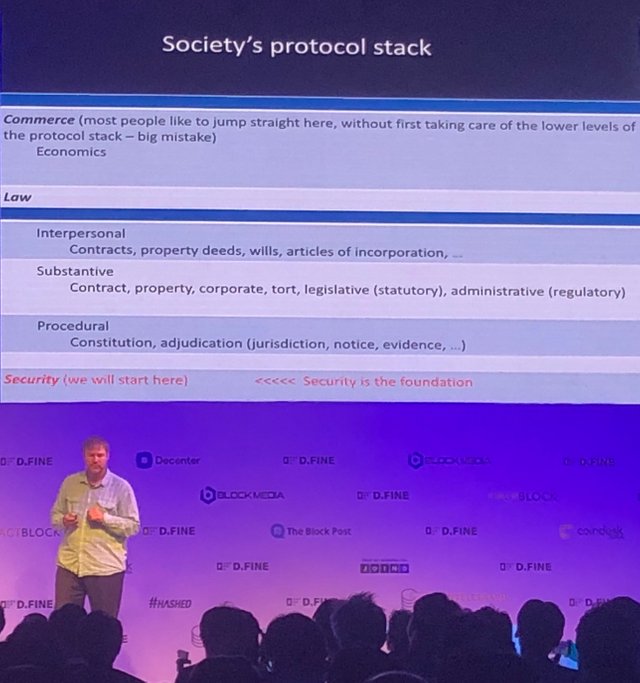Nick Szabo: On Trust Minimization
Of all the many people I had not seen or heard speak before, Nick Szabo was probably the speaker I was looking forward to hearing the most this week at Korea Blockchain Week. After all, it's not every day that you get to listen to a person who has been in the blockchain industry since before the blockchain industry was an industry.
His work is one of the inspirations for Ethereum. He is widely credited with inventing the smart contract. If you'd like to fall down the rabbit hole and study the myriad thoughts and ideas produced over time by a true polymath, check out Szabo's blogspot, Unenumerated. What I will try to do with this short note is merely try to explain his D.Fine speech (or at least a part of it for now) in the hopes that I might understand it better myself afterwards.
Society is composed of many layers. To a software guy like Szabo, these layers look just like protocol stacks, each progressive layer defining a suite of services that enable more complex functions on the layer above it. The basic foundation of any suite of protocols is security. If we apply this reasoning to society itself, it makes sense. Without security, there can be no law or commerce. Humans themselves did not begin to develop higher functioning societies until we had firmly left the hunter & gatherer phase. Only once the cave was secure did we truly start to develop civil society and all of the social and legal institutions, some may say trappings, that go along with it.
From a caveman's perspective, being secure means having a defensible, dry, and easy-to-warm habitat close by to plentiful food sources. In the modern world, insomuch as we consider ourselves to be living in such a thing, security has taken on the additional functions of mobility, economic stability, and maybe even mental stimulation/entertainment.
Boredom is death these days.
In the digital sense of society, at least in Szabo's worldview, being secure means trust minimization. This mouthful of a phrase arises from cryptography's obsession with the TTP - a trusted third party. In the current economy and mostly since the age of globalization started with the Dutch, Spanish and Portuguese navigating to the ends of the Earth seeking exotic goods for trade, in order to transact, consumers have needed a trusted intermediary to do it. From the early days of those Merchant Adventurer types to today's formalized banking relationships, trust has been a prerequisite for commerce.
To Szabo, a trust-minimized and therefore secure technology means that "a feature is more secure if it is less vulnerable to counterparties and third parties." It is so important to embed trust-minimization into the very core of technology that developers should be thinking that it "can be applied to any feature of your product." Wherever we can apply this trust-minimization logic (sometimes we just can't), we should.
The way I understand this point is that, we are moving to a society that is run less on informal relationships, which is pretty much how things have gotten done for centuries. In China, we call this guanxi. In the South, we call this good ol' boy-ism. I'm sure everywhere has their own colorful term for this concept. Not to say that such a seachange will happen over night, if you're a good ol' boy you'll still be able to leverage your contacts for quite some time. However, our society seems to be moving, albeit ever so slowly, toward relying upon codified relationships, relationships that are formalized "in code." If that is truly where we are headed, then trust-minimization should absolutely be Priority Number One.
According to this paradigm, Bitcoin is a fundamental protocol layer for the future society. Bitcoin makes a tradeoff between mental costs (low) and computational costs (high) to maximize trust minimization, which allows digital payments (value transfers) to be “globally seamless.”
Therein lies the opportunity. A lot of what was talked about at Korea Blockchain Week was the hegemony with which large multinational corporations (MNCs) have influence over our lives. As I explained in my David Chaum post, there is a set of people that truly believe that blockchain technology is our "last best chance" to reclaim our individual sovereignty before the state slowly fades into a fog where corporation and state essentially act as one (or a few) large monoliths.
Bitcoin and smart contracts, via trust minimization, are breaking down the MNC advantage. Hopefully, we’ll start to see multi-national small businesses, because you won't necessarily have to be large and connected in order to have success in international business. If that ever comes to pass, it will be entirely thanks to the tech. In blockchain-based systems, Layer 1 is trust minimization. If you get that right, then you can make Layer 2 solutions that sacrifice a little of that trust minimization to do cool stuff. Here Szabo refers to his favorite toys: Lightning chicken feeders and Lightning vending machines.



I've thought some about trust minimization over the past couple years as I've delved into things blockchain. To me, there are different levels of trust that have to be analyzed and reproduced in order for two parties to come together. This is a somewhat different point than what Szabo is making here as I am looking at the social-interaction level.
At a very basic level, there is the trust of competence. This is maybe 10% of what matters. If you are a software developer and someone is looking to hire you, then some kind of objective display of knowledge is beneficial.
The other 90% though is a much more personal level of trust. Is this person someone I can rely on? Will we get along? Is this person competent, but a complete jackass?
To that end, I think we will see evolving a domain-level, blockchain-based reputation system. It will be like LinkedIn's system where others vote for you, but within different domains of knowledge. Person A might say you are a skilled mathematician. Person B might say you know your craft beers. Person C might say you stick to your commitments.
Does Person D want to business with you? D can check your scores and make a determination.
It's not a truly trustless system, but it decentralizes trust from each person and spreads it to the network so you aren't relying solely on one person's representation of himself.
That’s why I don’t like the word trustless. Szabo uses trust minimization, I think, because it is more accurate. You either are trusting the protocol or the person, but probably more likely the trust you require to conduct the transaction lies on some sort of continuum between the person(s) and the tech protocol(s).
Thank you so much for participating in the Partiko Delegation Plan Round 1! We really appreciate your support! As part of the delegation benefits, we just gave you a 3.00% upvote! Together, let’s change the world!
Thank you for posting from the https://steemleo.com interface 🦁
Shouldn't it be trust maximisation? I'll have to re-read it, will look at his blog too. I mean, being a comfortable urban zombie is a trust max in that the environment will not mug you. (?) It looks back-to-front atm.
But BC tech is also a great way for the MNCs to gain full spectrum control of humans - that is their plan. So the arguments are not about pro or anti BC but what kind of BC would be most tamper-proof by the oligarchs/gangsters.